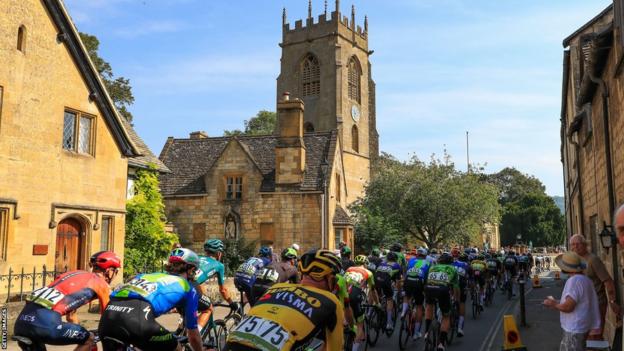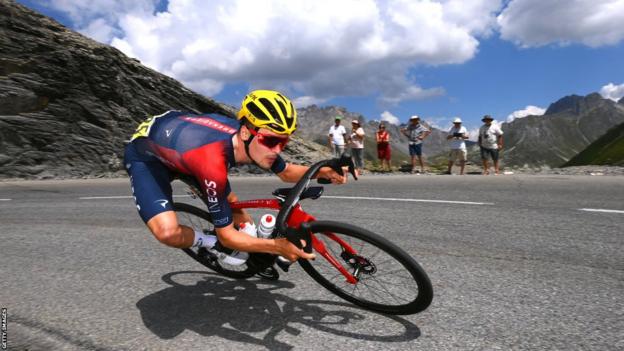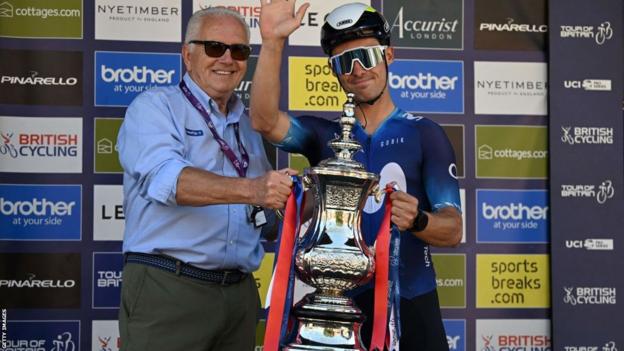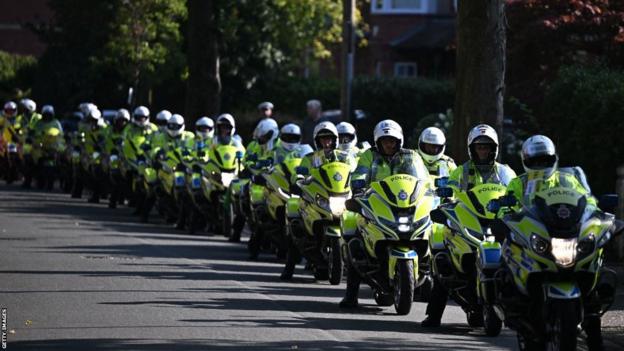
Putting on cycling road races in the UK is “most definitely” the hardest it has ever been according to an organiser of Britain’s showpiece events – with top riders also concerned.
“It’s most definitely [the hardest it’s ever been],” Mick Bennett, organiser of both races, said. “The [Tour of Britain] is something short of £3m a year to put on – it frightens the death out of me.
“The costs are just enormous. I’ve been doing this since 1983… the cost of living has gone up, local governments are being squeezed; if they have to a choose between closing a library or a youth club, they’re not going to do that [fund a cycling race above those public services].”
Tour of Britain organisers must rely upon local authorities to pay for the race to pass through towns and cities, as well as make road improvements.
The race itself also must foot large bills for the policing of a rolling roadblock to minimise disruption and keep riders and crowds safe.
The model in other countries such as France and Spain can often be very different and much cheaper.
In August, national governing body British Cycling announced a task-force to determine what needs to be done to preserve racing in the country.
Former professional and Olympic gold medallist Ed Clancy will lead a team of eight people to find solutions.
“There’s a couple of undeniable problems we’re facing,” says Clancy. “The crux of it is funding… policing costs are significant: I believe it cost the Tour of Britain organisers over £500,000 to police the roads this week; the three-week Vuelta a Espana doesn’t cost anything I believe.
“There’s not a bottomless pit of money – and I think that’s playing its part in the elite domestic road scene.”
A clearly concerned Bennett added: “British Cycling really need to look at it, I don’t think [the racing scene] an contract any more – it’s at the limit now. But they have done a good job forming this committee.”

What do the current crop of talent think?
As things stand, Britain boasts several riders who are winning races at the very top of the sport, including Olympic mountain bike gold medallist and Tour de France stage winner Tom Pidcock of Ineos Grenadiers, who also told BBC Sport in July the scene was the “worst he had seen it”.
The 2020 Giro d’Italia winner Tao Geoghegan Hart, now of Lidl-Trek, said: “There’s thousands of people with a huge passion for the sport of cycling in the UK.
“I think there’s multiple different things to look at. The most pressing and worrying is the lack of races. Races take so many moving parts and especially volunteers and sponsors and even local councils and organisations.
“There’s no women’s [World Tour] team [in the UK]. There was no Women’s Tour [this year]. That, for me, is not acceptable, if we see ourselves as this big cycling nation with the Olympic medals and the Tour de France victories and all the other accolades.”
The loss of the Women’s Tour this year was a big moment. Bennett says it is slated to return in 2024.
A progressive, World Tour-classified race, it was once the first in the world to pay its winner the same as its men’s equivalent, in this case the Tour of Britain.
Lidl-Trek’s Lizzie Deignan – the 2015 road world champion – said: “I’m disappointed and can also say I don’t quite understand how it has happened. From my perspective, when I’m out in the UK training on British roads, participation levels are higher than I’ve ever seen before.”

How far has racing in the UK fallen?
Clancy also believes participation in the UK – the number of people who are riding with clubs, spending disposable income on bikes and riding for leisure and commuting – is relatively healthy.
And while the men’s Tour of Britain has seen thousands flock to the race across England and Wales this month – including half a million in Manchester for the opening stage alone – it was strange to see overall winner Wout van Aert wearing a leader’s jersey without a single race sponsor emblazoned on it, despite taking the same design as last year.
It was an entertaining race, animated by the sport’s most successful unit – Van Aert’s Jumbo-Visma – and of course road cycling’s de facto British team Ineos Grenadiers.
But only five of the World Tour teams featured in the 16-team event this year. In 2018, there were 11. Until recently, there was always a high quota of the world’s best riders showing up for this race, as there was in the 1980s when the Tour of Britain was known as the Milk Race.
Bennett added: “We’ve had Brexit, we’ve had Covid, we’ve had the Queen dying five days in and with three stages to go [last year].”
The 2022 Tour of Britain was abandoned after the death of Queen Elizabeth II, with all the planning for the remaining stages ultimately resulting in no cycling on the day. While it was a time of mourning for the nation, cycling bosses also had a bill to pick up.
Bennett said: “Those places paid a lot of money to run the race, and they still want their pound of flesh. We honoured all of those.
“You can imagine the situation we’re in. That’s why the Women’s Tour had to go, that’s why the Tour Series had to go. It was too early in the year to raise the funding to do it.”

Why not just watch cycling on the telly?
The Tour de France attracts a huge global audience in July each year, and can compete with many of the top sporting events around the world.
Considering British cyclists are winning their fair share of the top races, such as Pidcock in last year’s Tour on the legendary Alpe d’Huez climb, it can be easy to believe British racing is in great health.
Below that level, however, there are many teams who rely on races such as the Tour of Britain – some of whom are blazing the trail for change in a sport that, in some areas at least, badly needs it.
Saint Piran – a Cornish ‘continental’ level team – run programmes on rider mental health and sustainability, the latter being something of a grey area in a sport in which very few carbon footprints are declared.
The Tour of Britain is critical to the survival of teams on smaller budgets – one of which, AT85, folded in the middle of the 2023 season.
“It’s very important to make sure the club scene is very healthy,” says Saint Piran team boss Ricci Pascoe.
“At World Tour level we’re doing great, because Olympic medallists are coming out of World Tour teams. But we’re being squeezed at the ‘conti’ level and that’s the problem really.
“It’s kind of the development level. If you’ve got a late developer we’ll pick them up, and we’ll probably put back two or three riders into the World Tour.”
The future
British Cycling has been quick to form a taskforce to find out more, and Clancy as chair and his wider team say they will report back with recommendations sometime early next year.
“Race organisers can’t continue to keep losing money year on year,” says Clancy. “I believe in the positive benefits of cycling – a long time ago I remember watching the Milk race come through Holmfirth; it’s one of my first memories, standing there with my grandad.
“It’s not just the benefits to elite sport. I believe in the trickle-down effect – encouraging communities and leisure cyclists and commuters to get involved and get a bike out.”
Clancy hopes the recent drop-off is a “short-term thing”, and despite the struggles, Bennett’s passion and optimism has never waned.
Bennett said: “Seeing the passion of the kids… that child at the side of road who spent their whole day designing a poster or flag, and hasn’t slept the night before because they are excited.
“Seeing them all in their uniforms screaming their heads off. It’s just wonderful. I get emotional just thinking about it.
“And the riders love it – they do not get that in Europe.”
